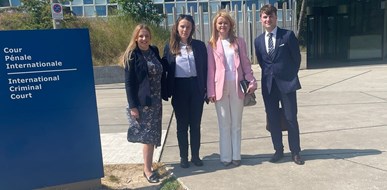Exchange meeting focuses on conflict-related crimes against children in Ukraine
Published 7 June 2023
From left to right: Ruby Axelson (Global Rights Compliance), Gabriela Radu (Asser Institute), Yuliia Usenko (OPG) and Igor Furman (interpreter).
The Hague – On Monday and Tuesday 7 and 8 June, an international exchange meeting took place with Ms Yuliia Usenko, the Head of the Department for the Protection of Children’s Rights from the Ukrainian Office of the Prosecutor-General, in The Hague. The meeting, which focused on conflict-related crimes against children in Ukraine, kicked off with a conference in Oslo, followed by additional meetings in The Hague.
The exchange meeting with Ms Yuliia Usenko, Head of the Department for the Protection of Childrens’ Rights from the Ukrainian Office of the Prosecutor-General, provided a crucial platform for stakeholders to discuss conflict-related crimes against children in Ukraine. Participants shared insights, experiences, and strategies to enhance the protection and well-being of children affected by armed conflict.
The visit took place within the context of the MATRA-Ukraine project ''Strengthening Ukraine’s Capacity to Investigate and Prosecute International Crimes", a joint initiative of the T.M.C. Asser Instituut and Global Rights Compliance (GRC), funded by the Dutch Ministry of Foreign Affairs. Alongside supporting the Office of the Prosecutor-General in Ukraine, the project delivers vital technical and strategic expertise to other criminal justice entities, such as judges and lawyers, civil society organisations and journalists.
Protection challenges
The exchange meeting began in Oslo, where Ms Yuliia Usenko participated in an international conference titled 'Protecting children in armed conflict: Our common future', which was held to increase awareness and understanding of decision-makers on the protection challenges that children face in war and conflict.
In The Hague, Ms. Yuliia Usenko had meetings with representatives from the Asser Institute and GRC, experts in children's rights, including from Defence for Children, Dutch prosecutors, and representatives from international and regional organisations, such as the International Development Law Organization (IDLO), the International Criminal Court (ICC) and Eurojust.
Read more
[Launch]First of its kind basic investigative standards for documenting international crimes in Ukraine
On 23 May, the EU Day against Impunity for genocide, crimes against humanity and war crimes, Global Rights Compliance launched the ‘Basic Investigative Standards for Documenting International Crimes in Ukraine’ (BIS-Ukraine) - a unique toolkit aimed at supporting the work of civil society organisations, human rights defenders and other practitioners documenting international crimes in Ukraine. The Basic Investigative Standards Manual was developed in the MATRA-Ukraine project, “Strengthening Ukraine’s Capacity to Investigate and Prosecute International Crimes”, which is led by Global Rights Compliance (‘GRC’) and the Asser Institute, and funded by the Netherlands Ministry of Foreign Affairs. Read more.
[Podcast]: ‘Ukrainian war crimes trials with Ukrainian judges
Leaving the court every time the alarm goes off and working around power cuts that have halved working days to four hours. These are some of the working conditions of judges in Ukraine. The potential war crimes cases being investigated now amount to 36.000. How are Ukrainian judges managing these pressures? International justice podcast makers Asymmetrical Haircuts talked to Ukrainian judges Hanna Maina and Svitlana Yakovleva about their realities and how the Ukrainian judiciary is adapting. Read more.
Strengthening Ukraine’s capacity to investigate and prosecute international crimes
The MATRA project ''Strengthening Ukraine’s Capacity to Investigate and Prosecute International Crimes" is a joint initiative of the T.M.C. Asser Instituut and Global Rights Compliance. Alongside supporting the Office of the Prosecutor-General, the project delivers vital technical and strategic expertise to other criminal justice entities, such as judges and lawyers, civil society organisations and journalists. The project is funded by the Netherlands Ministry of Foreign Affairs under the MATRA (MAatschappelijke TRAnsformatie: social transformation) Programme and supported by the Netherlands Ministry of Justice and Security.
